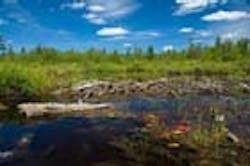Proposed Drilling Raises Concerns About New York Water Supply
For the last several months, residents of upstate New York have been meeting to discuss what will happen if ambitious plans to expand drilling for natural gas proceed, the New York Times reported. Opponents of the drilling say leaders have been slow to react, even though the area includes the watershed that supplies most of New York City’s drinking water.
“We effectively risk ruining our drinking water and turning a pristine area into an industrial landscape,” said Buck Moorhead, 55, an architect, of the effect both upstate and downstate. Moorhead has a second home in Sullivan County. “The whole thing is like a nightmare.”
“In the absence of a real rallying cry coming from the city to vigorously protect the water supply, we’re going to get rolled,” said James F. Gennaro of Queens, chairman of the Council’s environmental committee, which has been holding the hearings. Gennaro is currently gathering signatures on a petition in support of a drilling ban.
New York City Mayor Michael R. Bloomberg has not weighed in on the issue. “The mayor appreciates the need for energy, but believes it must be obtained in a responsible way,” said one of his spokesmen, Marc La Vorgna.
“The watershed’s protection must be guaranteed before any drilling moves forward.” The City Department of Environmental Protection is waiting to take a position until it hears from a consultant it hired to analyze potential threats to the water supply.
But Gennaro and others, such as environmental groups like the Natural Resources Defense Council, are calling for a ban on drilling in the million-acre watershed. They say the drilling represents an inherent risk to the water, which is so pure that it does not require filtration before arriving in the taps of more than 8 million people in the city. Any contamination, they say, would require the investment of billions of dollars in a filtration plant, meaning higher water rates.
Steven W. Lawitts, the acting commissioner of the city’s environmental agency, said drilling on the scale now envisioned posed “great risks” and could hamper his department’s ability to keep the water clean, the newspaper reported.
One major concern is the use of benzene and other chemicals used in drilling that have been known to contaminate groundwater in other states. Applicants for permits would have to disclose all components in drilling fluids, the state environmental commissioner, Alexander B. Grannis, said.
Although state officials say that they have the ultimate say when it comes to drilling, Lawitts said city regulations “can still govern what activity is permissible or not permissible” on watershed lands.
Among those seeking a state ban on drilling in the watershed are environmental groups such as Riverkeeper and Earthjustice. William C. Thompson Jr., the city comptroller, sent the state a letter warning that drilling could have “crippling implications” for customers if it reduces the quality of the unfiltered water, the newspaper reported. A filtration plant would cost $6 billion to $10 billion just to build, he said, requiring at least a 30% increase in water and sewer rates.
Source: New York Times
